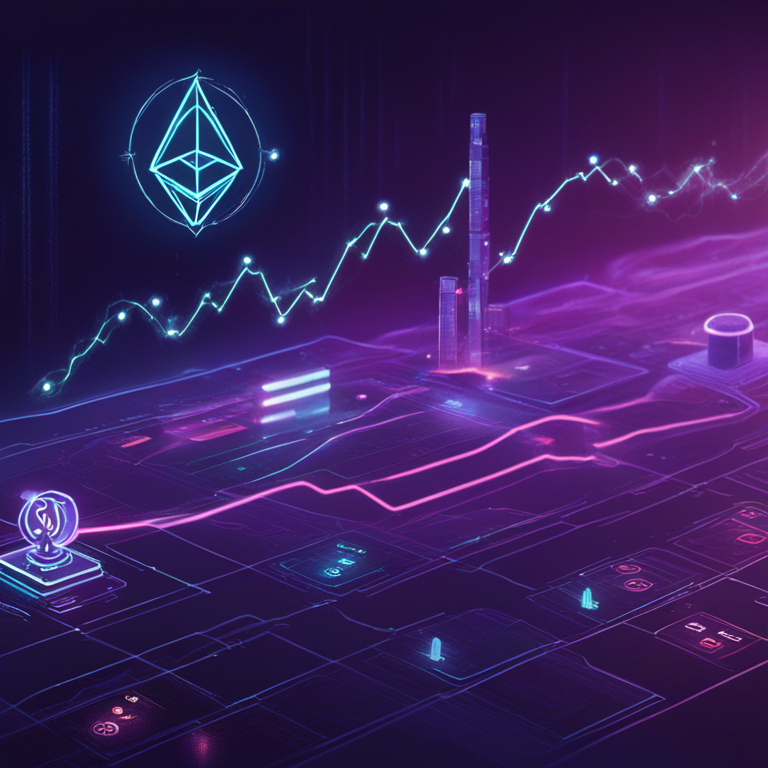Ethereum's Gas Crisis Over? Vitalik Buterin Presents New Solution
- byAdmin
- 14 May, 2024
- 20 Mins

Introduction
Are we witnessing the end of Ethereum's gas crisis? Hold onto your digital hats, folks, because the brainy wizard of the blockchain world, Vitalik Buterin, has just dropped a proposal that might transform how Ethereum handles transactions. With Ethereum's notorious gas fees often causing financial heartburn for users, Buterin's latest maneuver could spell relief. Let's dig into the nitty-gritty of this exciting new development and see if it really has the potential to smooth out those blockchain bumps.
Vitalik Buterin's Proposal
Vitalik Buterin, the co-founder of Ethereum and a perennial favorite at blockchain geek conventions, has unveiled a new proposal aimed at optimizing Ethereum's transaction calldata and gas usage. Now, if you're wondering what on earth ‘calldata’ is, think of it as the backpack carrying all the data your transaction needs to function. Buterin's innovative proposal, cheekily tagged EIP-7706, introduces a new kind of gas specifically for these pesky calldata transactions. By tailoring gas fees and usage limits for calldata separately from other transaction components, Buterin aims to streamline Ethereum’s bustling traffic and make transactions more wallet-friendly. So, is this just another pie in the decentralized sky, or a groundbreaking fix? Let's find out.

EIP-7706: A Novel Approach
Enter EIP-7706, the star of the show. This new proposal isn't just a tweak; it’s a full-on facelift for Ethereum’s current gas infrastructure. The clever mechanism behind EIP-7706 revolves around a separate fee market for calldata transactions. Imagine a bustling marketplace where calldata now has its own stall, complete with unique pricing and space limits. Vitalik envisions reducing the maximum size of calldata per block while also lowering its average cost. The idea is to lighten the data load per block, making transactions faster and more efficient.
Moreover, EIP-7706 brings a new type of transaction into the mix, one that handles basefee and priority fees through unified code paths. Picture it like one of those multi-tool gadgets that can open a bottle, fix your bike, and maybe even save you from a zombie apocalypse. By seamlessly integrating all three gas types into the same code pathways, Buterin aims for a more consistent and efficient network. This proposal dovetails neatly with his recent thoughts on multidimensional gas—a fancy term for a more versatile transaction processing model. Overall, EIP-7706 signals a significant leap forward in Ethereum’s ongoing evolution, promising greater scalability and readiness for the blockchain future.

Motivation behind the proposal
So, let's dive into this new proposal by Ethereum’s very own whiz kid, Vitalik Buterin. Vitalik aims to tidy up Ethereum’s gas problem, which has been a bit like trying to squeeze elephants through a garden hose. Dubbed as EIP-7706, this draft proposal is tailored to optimize transaction calldata and gas usage within the Ethereum network. If you’ve ever cringed at sky-high gas fees, this one's for you. Buterin’s master plan involves creating a separate fee market for calldata transactions. Now, this might sound like some fancy coding wizardry, but it boils down to reducing the size of data chunks (calldata) to make them more affordable per block. This means lower costs and a happier wallet for all of us Ethereum enthusiasts.
But wait, it gets better. The underlying motivation behind this proposal is rooted in addressing the inefficiencies in Ethereum's current gas model. Our gas limit might look acceptable on the surface, but there are concerns about whether the network can juggle increased transaction volumes without turning into Gridlock City. EIP-7706 aims to bring order to this chaos by introducing a neat mechanism to manage calldata gas, thereby optimizing block space and reducing transaction costs. It’s like having a master cleaner for your cluttered crypto drawer!
Unified gas types handling
Ever felt the annoyance of switching between different types of gas in Ethereum? Imagine it like trying to cook with three different stoves simultaneously, not fun, right? Vitalik Buterin seems to think so too, which is why EIP-7706 also proposes a unified approach to handling gas types. This means you'll have a new transaction type incorporating basefee and priority fee as a vector, using the same code paths for all three gas types. It's like an all-inclusive vacation package for your crypto transactions, ensuring consistency and better efficiency across the board.
This unified handling is not just a minor tweak; it’s a significant enhancement to Ethereum’s infrastructure. By streamlining the process, Buterin aims to create a more stable and efficient network. Think of it as upgrading from dial-up to fiber-optic internet — smooth and fast. Plus, it simplifies the operation for developers and users alike, potentially transforming the Ethereum experience from a congested highway to a breezy park stroll.

Multi-dimensional gas model
But the pièce de résistance here is the introduction of a multi-dimensional gas model. If you thought Ethereum’s gas system was a one-trick pony, think again. Vitalik is pushing us into a future where the gas model is not just a flat, linear construct but a multi-dimensional marvel. This shift is like going from painting in 2D to creating immersive VR experiences. The multi-dimensional model promises increased scalability, efficiency, and better readiness for the future demands of the Ethereum network.
So, what does this mean in practical terms? It means that instead of having a single, uncomfortable lane for your transactions, you now have a multi-lane highway with plenty of room to zoom through. This new model will handle diverse types of computation and storage needs more efficiently. Imagine Ethereum’s network as a Swiss Army knife, equipped to handle different tasks precisely and effectively. It’s a brave new world for Ethereum, one where blockspace is optimized, costs are cut, and efficiency is king. Welcome to the future of gas!

Ethereum's gas crisis over? Vitalik Buterin presents new solution
Ethereum, the world's second-largest cryptocurrency by market cap, has been haunted by the ghost of high gas fees for what seems like eons now. Every time you think it’s gone, it comes haunting back, like that ex who keeps popping up on your social media. But fret not, crypto enthusiasts! The prodigious founder, Vitalik Buterin, has revealed a game-changing proposal to tackle this nagging issue once and for all.
Let’s dive into what Vitalik has up his sleeve this time. He’s introduced EIP-7706, a proposal that's supposed to be the silver bullet for Ethereum's gas problems. In layman’s terms, it means optimizing transaction calldata and gas usage. Now, I know that might sound as thrilling as watching paint dry, but it’s a vital development for anyone using Ethereum regularly.

Vitalik's vision
Vitalik’s proposal isn’t just any run-of-the-mill suggestion. He wants to create a separate fee market for calldata transactions. This includes distinct base fees and per-block gas limits which could potentially reduce the theoretical maximum calldata size per block, making it more affordable overall. Sounds fancy, right? But what it really means is that sending transactions on the Ethereum network could cost way less in terms of gas fees. Think of it as getting a VIP ticket for the price of general admission.
Moreover, there's a significant addition in this proposal: introducing a new transaction type that deals with the base fee and priority fee together. It’s like bundling your internet and TV subscription for a better deal. This unified approach ensures a smoother operation across different gas types, enhancing the overall efficiency and stability of the Ethereum network. Vitalik’s vision brings to light a more nuanced approach to handling gas fees, something he’s been advocating for a while. This transition from a single-dimensional gas model to a multi-dimensional one could be the breakthrough Ethereum needs to remain competitive and efficient.
Conclusion
It’s clear that Vitalik Buterin is playing the long game with Ethereum, continually pushing for improvements that keep gas fees in check while enhancing the network's overall efficiency. The introduction of EIP-7706 is another step towards a more scalable and user-friendly platform, which could bode well for the future of decentralization. So, keep your fingers crossed and your wallets ready; Ethereum might just be on the brink of a gas fee revolution.
Ethan Taylor
Ethan Taylor here, your trusted Financial Analyst at NexTokenNews. With over a decade of experience in the financial markets and a keen focus on cryptocurrency, I'm here to bring clarity to the complex dynamics of crypto investments.



